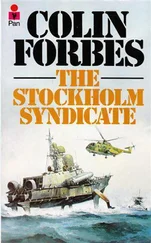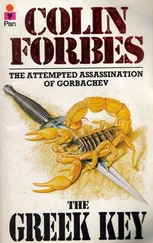Colin Forbes - The Leader And The Damned
Здесь есть возможность читать онлайн «Colin Forbes - The Leader And The Damned» весь текст электронной книги совершенно бесплатно (целиком полную версию без сокращений). В некоторых случаях можно слушать аудио, скачать через торрент в формате fb2 и присутствует краткое содержание. Жанр: Шпионский детектив, на английском языке. Описание произведения, (предисловие) а так же отзывы посетителей доступны на портале библиотеки ЛибКат.
- Название:The Leader And The Damned
- Автор:
- Жанр:
- Год:неизвестен
- ISBN:нет данных
- Рейтинг книги:3 / 5. Голосов: 1
-
Избранное:Добавить в избранное
- Отзывы:
-
Ваша оценка:
- 60
- 1
- 2
- 3
- 4
- 5
The Leader And The Damned: краткое содержание, описание и аннотация
Предлагаем к чтению аннотацию, описание, краткое содержание или предисловие (зависит от того, что написал сам автор книги «The Leader And The Damned»). Если вы не нашли необходимую информацию о книге — напишите в комментариях, мы постараемся отыскать её.
The Leader And The Damned — читать онлайн бесплатно полную книгу (весь текст) целиком
Ниже представлен текст книги, разбитый по страницам. Система сохранения места последней прочитанной страницы, позволяет с удобством читать онлайн бесплатно книгу «The Leader And The Damned», без необходимости каждый раз заново искать на чём Вы остановились. Поставьте закладку, и сможете в любой момент перейти на страницу, на которой закончили чтение.
Интервал:
Закладка:
Geneva-Munich sector.'
'And it is a rogue transmitter?' Schellenberg persisted.
'I've checked the lists of all our call signs – hundreds of-them – and it's not one of ours. It's the same man, too. I've come to recognize his fist…'
'Let me think a minute.'
Walter Schellenberg had been appointed Chief of SS Intelligence as successor to Reinhard Heydrich when the latter had been assassinated by a team dropped into Czechoslovakia for that express purpose.
A tall, handsome and well-dressed man – he invariably wore civilian clothes – Schellenberg was one of the few Nazi leaders who could be described as a genuine intellectual, who preferred using brains to jackboots. Off his own bat – with Hitler's full approval – he had assigned to himself the task of hunting down the Soviet spy inside Germany he was convinced was passing to the Kremlin full details of the Fuhrer's military planning.
Faced with such a task, an experienced gamekeeper – or spy-catcher – concentrates on the spy's weakest point, his system of communication. The method had often succeeded in the past. It required patience and determination – qualities Schellenberg possessed in full measure.
'You need use of our advanced mobile monitoring system,' he suggested.
'With that we could get a cross-bearing – pinpointing the precise source of the transmitter,' Meyer agreed. 'Could I suggest where it should be positioned?' he enquired.
'Tell me and it shall, be done,' the SS chief assured him.
Meyer thought Schellenberg was a fine fellow. Despite his exalted rank he talked to you like an equal. Always smiling, charming, affable, not like some of the other thugs who came down from Berlin and threw their weight about.
True, Schellenberg had a downward curve to his lower lip which suggested ruthlessness. But a man • like that shouldered enormous responsibilities. Drawing up a chair, Schellenberg sat down and waited patiently while the section chief considered his question.
For Schellenberg, Meyer was a valuable instrument. You handled him with finesse and consideration, as you would a Stradivarius. Meyer could hold the outcome of the war in his hands if he tracked down this rogue transmitter. Schellenberg was convinced it was the route along which Germany's most cherished secrets were being passed to Moscow.
'Strasbourg,' Meyer said eventually after consulting a large-scale map of Europe on which he had traced the line, Madrid-Geneva-Munich. 'That's where I'd like the mobile monitor…'
'And another half-dozen men here allocated purely for your own use?'
'That would be a terrific help. It would save time…'
'Time is what we don't have. You are right. And always this call sign is on the 43-metre band? Then nothing more?'
'That's right. I think for the main transmission he switches to another waveband. We have to find that waveband. The extra men should do it.'
'Splendid! Splendid! I leave it to you, Meyer. Since you'll be directing a larger unit there will be promotion, extra pay, of course.'
This was another Schellenberg tactic. Dealing with anyone important to him, the SS chief always left them in a good mood, a mood of gratitude. It ensured their loyalty and support. And what Meyer had said was of great significance, confirming Schellenberg's growing conviction not only that clever Meyer had found the rogue transmitter, but also that the Soviets were involved.
It was known in the SD – SS Intelligence – that Russian agents used this little trick in wireless communication. Send out the call sign to make the initial contact on one prearranged waveband. Then switch to a second – also prearranged – waveband for transmitting the main signal.
Schellenberg cast one swift look round the vast floor divided up into glass, sound-proof cubicles. Inside each sat a radio monitor checking his own apportioned waveband. Dresden was the most efficient monitoring system which existed in the world at that time. He left the building and spoke to no one until he was seated beside his aide, Franz Schaub, in the car -which would take them to the airfield and the plane for Berlin.
'I'm pretty sure it's Switzerland, Franz. I've thought so all along. Why I don't know. Flood the place with more agents. I want them concentrated on Masson's lot. If Meyer can only give me proof, I have Masson by the balls. But why Switzerland?' he repeated with some exasperation.
As with most human activity, the outcome of great wars is often decided by eccentric characters.
The set-up in the summer-autumn of '43 was crazy.. The Red Army should have achieved total victory all on its own by the end of the year, rolling all the way to the Channel. It had everything going for it.
On the Eastern Front two million German troops confronted five million Russians. By numbers alone a less tough and determined Wehrmacht would have been overwhelmed.
In addition, by this time, the German military machine was directed from the Wolf's Lair by a pseudo-Hitler with little of the military flair of his predecessor. Their main similarity was the new Fuhrer's stubborn insistence on getting his own way.
On top of all these advantages, which should have handed the war to Stalin on a plate, the mysterious Woodpecker (via Lucy) was telling the Generalissimo in the Kremlin the movement of every German division. It should have been child's play to win, but the man with the withered arm, the ex-student from a seminary in Georgia, still couldn't pull it off. The Germans fought like tigers.
In Dresden Herbert Meyer, armed with his new resources, worked like the proverbial beaver to locate the rogue transmitter. Thirty years old, he should have been in the infantry or with the Panzers. But, like Goebbels, he had a club foot.
Tall as a beanpole, he had a head like a church mouse. A timid man, he had been the butt of his contemporaries at school. They had nicknamed him 'The Mouse', and the hated appellation dogged him in adult life. It may well have been this experience which led him to choose the solitary trade of watchmaker in peacetime.
Fate plays odd tricks on mere human beings. It was The Mouse's skill in working with precision instruments which eventually landed him in the great Monitoring complex at Dresden. He was the ideal man to hunt down Lucy. Chance and Walter Schellenberg had placed him in this unique position to decide the outcome of the Second World War.
The Mouse was now waiting to hear that the huge mobile monitoring system had been installed in the Alsatian city of Strasbourg. Then he could really get down to it and pinpoint the elusive transmitter he had nicknamed The Ghost.
In Lucerne, The Ghost – RR – continued to live practically off coffee and four hours' sleep a night. To catch the morning tram to the Vita Nova Verlag, studiously ignoring the loitering bodyguards who changed positions daily. To eat a sparing lunch, a meagre dinner.
All this was a chore prior to his real work which started late in the evening. The transmissions coming in from Woodpecker were longer now. Consequently, the signals to Moscow were also longer.
In his own quiet way, fussed over by the devoted Anna, RR was happy. The Swiss now thought him so important they provided this comforting protection. And after Kursk he knew that Stalin was listening to him. What more could a man want out of life?
'The Germans are smuggling in even more agents,' Masson warned Hausamann as soon as he arrived at the Villa Stutz and threw off his raincoat. 'Something very serious is taking place…'
Happiness was the last emotion Brigadier Roger Masson was experiencing. Hausamann, swivelling round in his chair away from a desk littered with papers, watched the counter-espionage chief.
'What are these agents doing?' Hausamann enquired – and received the last reply he would have expected.
Читать дальшеИнтервал:
Закладка:
Похожие книги на «The Leader And The Damned»
Представляем Вашему вниманию похожие книги на «The Leader And The Damned» списком для выбора. Мы отобрали схожую по названию и смыслу литературу в надежде предоставить читателям больше вариантов отыскать новые, интересные, ещё непрочитанные произведения.
Обсуждение, отзывы о книге «The Leader And The Damned» и просто собственные мнения читателей. Оставьте ваши комментарии, напишите, что Вы думаете о произведении, его смысле или главных героях. Укажите что конкретно понравилось, а что нет, и почему Вы так считаете.












